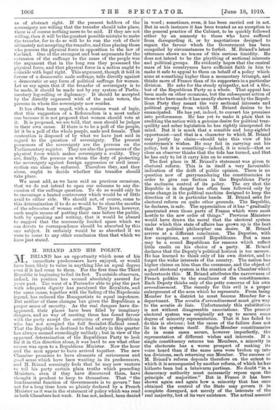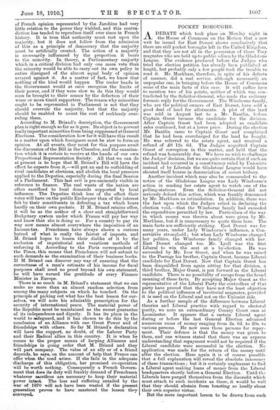M. BRIAND AND HIS POLICY.
BRIAND has an opportunity which none of his immediate predecessors have enjoyed, or would have been likely to value in anything like an equal degree even if it had come to them. For the first time the Third Republic is beginning to feel its feet. To outside observers, indeed, its position has seemed absolutely assured for years past. The want of a Pretender able to play the part with adequate dignity has paralysed the Royalists, and the same cause, together with the fading of the Napoleonic legend, has reduced the Bonapartists to equal impotence. But neither of these changes has given the Republican a proper sense of security. As the real dangers have dis- appeared, their places have been filled by imaginary dangers, and no way of meeting these has found favour with the party except the ostracism of .every Republican who has not accepted the full Socialist-Radical creed. That the Republic is destined to find safety in this quarter has always seemed exceedingly unlikely ; but in view of the apparent determination of the Republican Party to look for it in this direction alone, it was hard to see what other course was open to a. Republican Minister. Now the hour and the man appear to have arrived together. The new Chamber promises to have elements of seriousness and good sense which have been wanting in its, predecessors, • and M. Briand seemingly feels that he may now venture to tell his party certain plain truths which preceding Ministers, even if they have discovered them, have thought it prudent to -keep to themselves. That "the fundamental function of Governments is to govern" has not for a long time been so plainly declared by a French Minister as it was in the statement of policy which was read in both. Chambers last week. It has not, indeed, been denied in word ; sometimes, even, it has been carried out in act. But in each instance it has been treated as an exception to the general practice of the Cabinet, to be quickly followed either by an amnesty to those who have suffered from disregarding it, or by negotiations designed to regain the favour which the Government has been compelled by circumstances to forfeit. M. Briand's latest utterance shows no traces of this curious timidity. He does not intend to be the plaything of sectional interests and political groups. He evidently hopes that the central mass of his countrymen have sufficient faith in him to make it safe to appeal to them on behalf of a policy which aims at something higher than a momentary triumph, and thinks more of France than of its supporters in a particular division. He asks for the steady sympathy, not of a bloc, but of the Republican Party as a whole. That appeal has been made on other occasions, but the subsequent action of those who have made it has usually shown that by the Repub- lican Party they meant the very sectional interests and political groups from which M. Briand desires to be emancipated. He has yet, indeed, to convert his promises into performance. He has yet to make it plain that in crediting the nation with a genuine desire for political tran- quillity and sober legislation he has rightly interpreted its mind. But it is much that a sensible and long-sighted opportunist—and that is a character to which M. Briand may justly lay claim—should take this view of his countrymen's wishes. He may fail in carrying out his policy, but it is something—indeed, it is much—that so close an observer thinks that the tide has turned, and that he has only to let it carry him on to success. • The first place in M. Briand's statement was given tc electoral reform. This is in itself a very favourable indication of the drift of public opinion. There is no question now of gerrymandering the constituencies, in order to give one faction in the Republican Party the exclusive control of its policy. The cry that the Republic is in danger has often been followed only by some change in the political machine designed to keep the direction of it in particular, hands. M. Briand asks for electoral reform on quite other grounds. The Republic, he declares, is safe. The appreciation of it has " gradually penetrated even those parts of France which were most hostile to the new order of things." Previous Ministers would have drawn the moral that the electoral system under which this state of affairs has grown up is the best that the political philosopher can desire. M. Briand arrives at a different conclusion. The Deputies, with few exceptions, are sound Republicans. But a man may be a, sound Republican for- reasons which reflect little credit on his choice of a party. M. Briand declares that the Deputy's political horizon is too narrow. He has learned to think only of his own district, and to forget the wider interests of the country. The nation has higher claims on him than the commune, and the object of a good electoral system is the creation of a Chamber which understands this. M. Briand attributes the narrowness of French politics to the smallness of .the constituencies. Each Deputy thinks only of the petty concerns of his own arrondissement. The remedy for this evil is a proper enlargement of the area which he represents. From being Member for a district he must become Member for a department. The scrutin d'arrondissement must give way to the scrwtin de liste. Unfortunately this substitution is not without disagreeable associations. The present electoral system was originally set up to secure some degree of minority representation. That it has failed to do this is obvious ; but the cause of the failure does not lie in the system itself. Single-Member constituencies do in some cases secure, however imperfectly, the representation of different wishes and interests. If a single constituency returns ten Members, a minority in the electorate has a worse prospect of making its voice heard than if the same area were broken up into ten divisions, each returning one Member. .The success of M. Briand's reform depends therefore on the extent to which it is accompanied by another reform, of which he has hitherto been but a lukewarm partisan. No doubt "in a democracy • authority must necessarily repose upon the principle of majorities." But in France it has been shown again and again how a minority that has once obtained the control of the State may govern it in complete disregard, not merely of the interests, of the real majority, but of its very existence. The actual, amount of French opinion represented by the Jacobins had very little relation to the power they wielded, and this contra- diction has tended to reproduce itself ever since in French history. It is true that authority must rest upon the majority, but it does not follow from the admission of this as a principle of democracy that the majority must be artificially created. The action of a majority is necessarily influenced by the proportion it bears to the minority. In theory, a Parliamentary majority which in a critical division had only one more vote than the minority would be able to carry out its own policy in entire disregard of the almost equal body of opinion arrayed against it. As a matter of fact, we know that nothing of the kind would happen The cooler heads in the Government would at once recognise the limits of their power, and if they were slow to do this they would soon be brought to their senses by the defection of their wiser or more timid supporters. The reason why minorities ought to be represented in Parliament is not that they should overrule the majority, but that the majority should be enabled to count the cost of recklessly over- ruling them.
According to M. Briand's description, the Government plan is right enough so far as it goes. Its object is to prevent really important minorities from being suppressed at General Elections. The consideration how far it will have this result is a matter upon which foreigners must be slow to form an opinion. At all events, they must for this purpose await the discussion of the Bill in the Chamber, and the examina- tion which it is certain to receive at the hands of our own Proportional Representation Society. All that we can do at present is to hope that M. Briand's Bill will have the effect he expects from it,—will put an end to outbidding of rival candidates at elections, and abolish the local pressure applied to the Deputies, especially during the final Session of a. Parliament. This last evil is pre-eminently visible in reference to finance. The real wants of the nation are often sacrificed to local demands supported by local influence. The Deputies think less of the effect their votes will have on the public Exchequer than of the interest felt by their constituents in defeating a, tax which bears hardly on their own pockets. If M. Briand retains office, it will be as the author of a. clear and straightforward Budgetary system under which France will pay her way and know that she is doing so. For a country to pay its way now means almost everywhere the imposition of an Income-tax. Frenchmen have always shown a curious hatred of what is really the fairest of imposts, and M. Briand hopes to lessen their dislike of it by the exclusion of inquisitorial and vexatious methods of enforcing it. According to the Paris correspondent of the Times, this means that Frenchmen will not submit to such demands as the examination of their business books. If M. Briand can discover any way of ensuring that the correctness of a man's estimate of his income for fiscal purposes shall need no proof beyond his own statement, he will have earned the gratitude of every Finance Minister in Europe.
There is so much in M. Briand's statement that we can make no more than an almost random selection from among the many subjects on which he touched. On the principle of picking out what has the best lesson for our- selves, we will note his admirable prescription for the security of international peace. The material power of the Republic must be maintained as the surest guarantee of its independence and dignity. It has its place in the world to safeguard, and it has chosen to do this by the conclusion of an Alliance with one Great Power and of friendships with others. So far M. Briand's declaration will have the support, no doubt, of the Labour Party and their Radical allies in this country. It is when he comes to the proper means of keeping Alliances and friendships in going order that M. Briand and they will part company. The value of an ally or of a friend depends, he says, on the amount of help that France can 'offer when the need arises. If she fails in the adequate ' discharge of this obligation, her promised co-operation • will be worth nothing. Consequently a French Govern- ment that does its duty will frankly demand of Frenchmen • whatever sacrifices are necessary to keep their material power intact. The loss and suffering entailed by the war of 1870 will not -have been wasted if the present. generation -proves to have mastered the lesson they -conveyed.











































 Previous page
Previous page